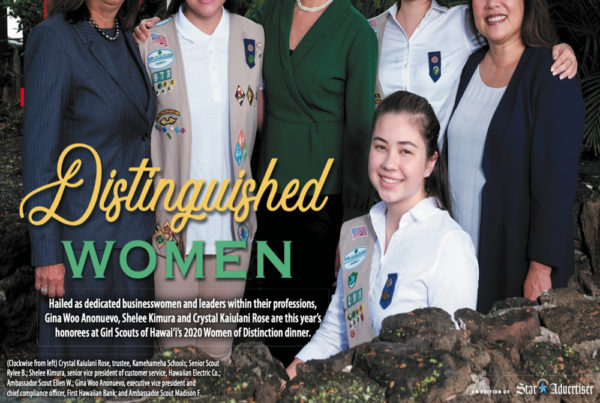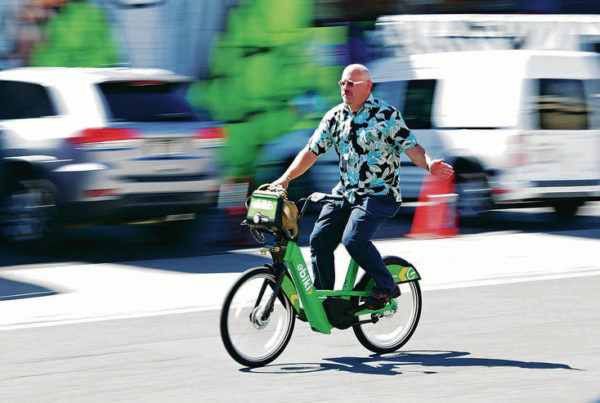Pacific Business News
June 27, 2019
by MEGAN FERNANDES
 I was a cocktail waitress at Stuart Anderson’s many years ago, and there was a cat outside. I took it home, and from then on my husband Saua and I both started bringing home animals to save. We kept doing that, saving as many as we could, and that became the story of our lives.”
I was a cocktail waitress at Stuart Anderson’s many years ago, and there was a cat outside. I took it home, and from then on my husband Saua and I both started bringing home animals to save. We kept doing that, saving as many as we could, and that became the story of our lives.”
That was the first cat that Alicia Maluafiti, founder of nonprofit Poi Dogs and Popoki, saved more than 30 years ago. Founded in 2009, she now runs her nonprofit to take care of 10 dogs out of her home and 130 cats out of a cattery on her property. Maluafiti has since lost her husband, but she continues to dedicate her time to saving and providing needed health care to animals across the island. Using two mobile veterinary service vehicles, contracted veterinarians provide spay and neuter surgeries, microchipping, vaccinations, free health screenings, flee treatments and deworming services at little to no cost to the pet owner.
“I started it to help the people who were helping the animals,” she said. “There is a shelter life mentality. We get focused on animal welfare but to help the animals, you have to help the people, too.”
For every $5 the nonprofit earns, an animal can be microchipped. For every $25, a feral cat can be trapped, sterilized and returned to its environment. For every $140, a male or female dog can be sterilized. For every $150, an animal is fostered, fed, cared for and adopted out. The profit made from adopting out an animal, comes solely from the $50 adoption fee.
“For a lot of nonprofits, [not breaking even] that’s the m.o. for us,” Maluafiti said. “We like the idea of being sustainable by bringing in the money to cover our costs but our endgame is to save animals from being euthanized [at kill shelters]. To do that, you have to invest in the animals. It’s costly but it’s worth it.”
The nonprofit has no full-time employees — all the veterinarians and vet techs are contracted and paid $15 an hour. Several grants enabled Maluafiti to buy two vehicles to provide affordable, mobile pet medical services.
How did you fund the start up phase? One of the things about small businesses, nonprofits especially, is that we use all of our own resources, we subsidize. That is what this property is for, it’s for the animals. Most of our money came from our own pockets. I just started applying for grants. We got little grants — $5,000, $10,000. We got a big PetSmart grant of $50,000 to spay and neuter cats and dogs of Native Hawaiians, and we got a city grant to buy a vehicle in 2014, the second vehicle we got in 2017.
How did you grow the nonprofit? The biggest problem with us, other nonprofits and small businesses alike, is that we can’t afford to pay people to do the work, so we end of doing a lot of it ourselves. For us, the untapped opportunity is partnering with businesses. We partner with Hunt Properties, and we go into Kalaeloa five times a year to trap, neuter and return feral cats to bring the cat population down. We parter with Haseko (Hawaii Inc.) to do the same thing — to help sterilize these animals that were impacting their business. They saw it as a win-win to partner with us. They pay for the spay and neuter, and we come in with the mobile clinic and provide services to the community.
How does the nonprofit afford providing services at little to sometimes no cost? Homeless people often come up to us and we spay and neuter their pet for free. We fundraise as much as we can to pay for those surgeries. There’s no way we could do what we want to do, and have an impact on the same number of animals and the people caring for them that we now do without fundraising. We started with the golf tournament fundraiser in Ewa Beach 11 years ago. It was very successful, and then we started annual pet walks, like the West Oahu Pet Walk, six years ago. That led us to start a Central Oahu Pet Walk, which is coming up on August 3. We are looking to expand this model into other communities. We raise enough for us to do the things that we really want to do for these animals, especially the free services. These rescued animals have to be fed, too, of course. I spend over $4,000 a month just on pet food. Even the penny drives that the schools do help. Once they raised over $1,300 — that’s close to 100 feral cats that we can sterilize for free. For small nonprofits literally every dollar counts.
How do you find the balance between the services you want to provide and what you can physically and financially provide? Sadly, the demand is higher, and we are limited by staffing limitations. There’s only so much you can do on a vehicle so we have to ask: What can we and can’t we provide? We have to look at the animal’s quality of life and cost. To provide more services we need more private sector vet and vet techs. We’re on the list to get a $115,000 grant to do wellness checks, and spay and neuter pets of the homeless. We will be able to provide flea treatment and vaccinate against the parvovirus, which is rampant and deadly. People care about their animals, often feeding the animal before themselves, so we are trying to take away the financial burden of proper prevention and well-being check ups, unplanned litters, flea and tick infestations. We offer what we can to take away all the barriers that can keep these animals from getting the services they need.
Closer Look
Poi Dogs and Popoki
Alicia Maluafiti, founder
Phone: 808-224-3648
Email: Alicia@poidogsandpopoki.com
https://www.bizjournals.com/pacific/news/2019/06/27/nonprofit-helps-animals-by-helping-owners.html






